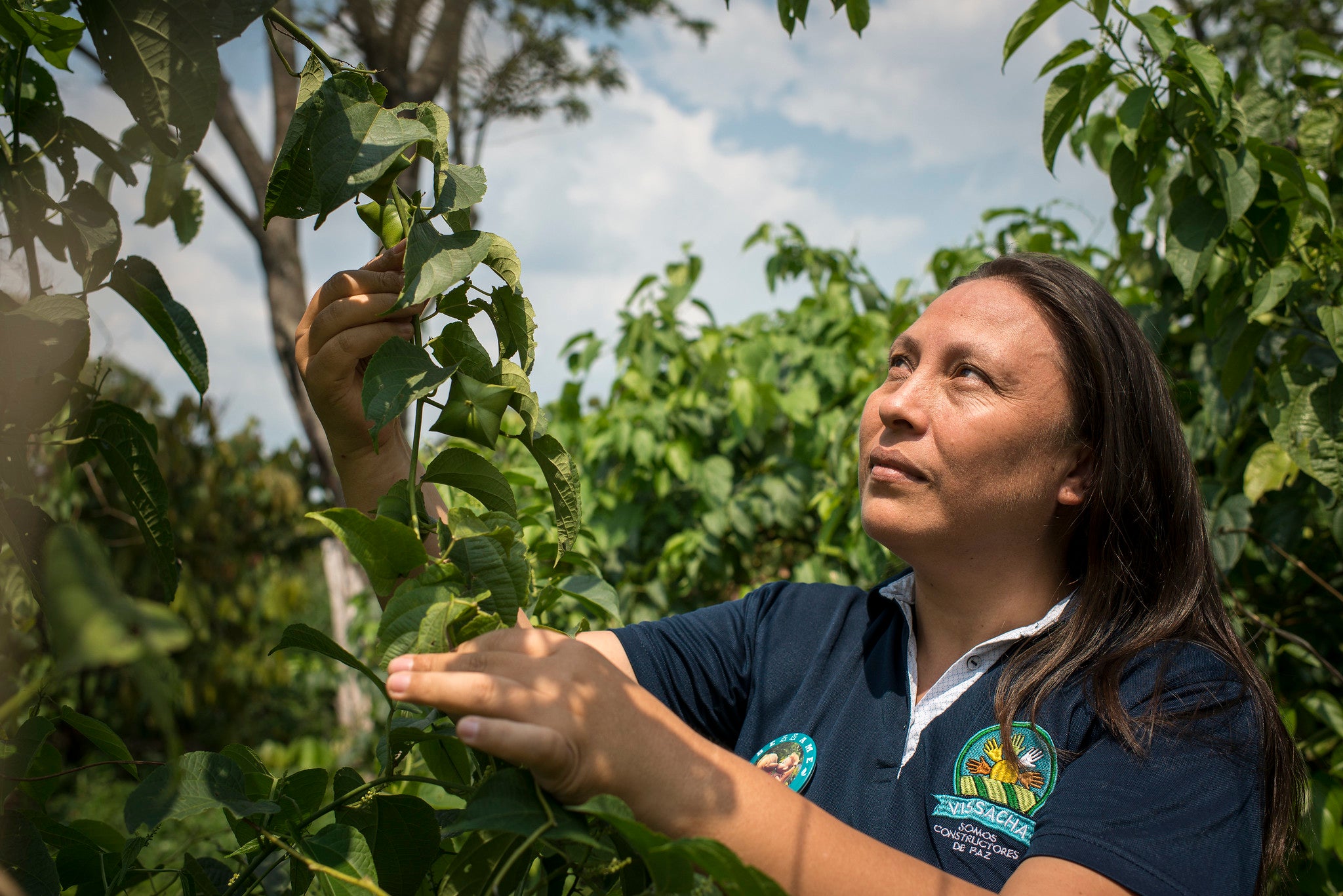 Sacha Inchi crop. Photo: Nadège Mazars/World Bank
Sacha Inchi crop. Photo: Nadège Mazars/World Bank
Feeling peckish? Before you reach for the almonds, try a handful of roasted sacha inchi. Known as the Inca or mountain peanut, this increasingly popular seed native to Colombia is a superfood that can be eaten whole as a nutritious snack or turned into an oil rich in proteins and vitamins.
Beyond its health benefits, production of the seed is opening up sustainable and legal income streams for rural farming communities in Colombia that were once dependent on illicit coca cultivation for their livelihoods. The sacha inchi crop is also helping to restore degraded land and reduce emissions from deforestation.
“It’s really a triple-win crop in this area,” says Jimena Silva, a 35-year-old woman I spoke to who heads the Vissacha Cooperative. Vissacha is a group of 160 farmers near the small town of Vistahermosa in Colombia’s central Orinoquia region. Together, these farmers produce sacha inchi, and hope to become leaders in the country’s emerging nature-based economy.
In the era of superfoods and greater consumer awareness, there is growing demand for environmentally-sustainable and biodiversity-based products such as sacha inchi. According to the UN, the global bio-trade market has grown from $40 million in 2003 to $4.3 billion in 2015, and is set to triple by 2030.
Jimena explained to me that some farmers in the area are encouraged by these trends, enough to move away from growing illicit coca and embrace the promise of sacha inchi. She says more and more farmers are convinced that sacha inchi can provide a new, legal and environmentally-sustainable opportunity to improve their livelihoods.
The remaining challenge is how to secure access to consumer markets to guarantee stable off-take. Jimena says better access is critical to reduce long-term project risk and offer more stable cash flow to farmers. So, Jimena and the Vissacha Cooperative are on a quest to find more reliable markets that could be a game changer for bio-diverse regions such as the Orinoquia.
Opening up access to bio-trade markets in Colombia
As one of the most biodiverse countries in the world, Colombia aims to unlock its bio-economy, but it still has a way to go . A recent article by Colombian business outlet Dinero reported that the country has more than 60,000 applicable plant species, but only 34 bio-businesses are currently engaged in such promising segments as biodiversity for health, food, cosmetics, and biotechnology.
Jimena explained to me that in addition to market inaccessibility, growth for farmers is also hindered by a lack of technical assistance and financing to develop biodiversity-based products, as well as cumbersome, regulations and certification to commercialize them.
For example, in Colombia, commercial-use permits for biodiversity-based products are defined by regional environmental authorities (CARs). Each of the 33 Colombian CARs has their own exploitation protocols, assessment criteria, and costs, leading to an overall lack of standard.
For Jimena, standardized rules through which biodiversity product permits can be obtained would not only create a clear and attractive environment for communities and businesses, but would also greatly increase the value of standing forests.
“Bringing specialized trade fares to a wider range of producers and small businesses in remote areas would go a long way in making biodiversity-based businesses more possible and more viable,” Jimena said.
To help Colombian farmers make the transition to sustainable biodiversity-based businesses, Colombia recently launched a large-scale program with the World Bank’s BioCarbon Fund Initiative for Sustainable Forest Landscapes (ISFL).
ISFL’s $20 million grant will help build a conducive business environment for sustainable agriculture practices and production systems, and strengthen institutional capacities to plan, implement, and monitor integrated landscape management. Colombia’s ISFL program will support aspiring bio-producers and ease trade by addressing cross-cutting issues, such as policy design, targeted extension services, and landscape-based certification. The program will also help deliver results-based payments to reward farmers, businesses, and other stakeholders for reducing carbon emissions through their low-carbon activities.
By building stronger connections with the private sector to promote sustainable productive agriculture, Colombia’s Orinoquia region has opportunities to unlock a nature-based economy based on its rich biodiversity and ecosystem services . This is great news for the protection of Colombia’s globally-significant forests and the mitigation of climate change. This is also great news for Jimena Silva, the Vissacha Cooperative, and all of us consumers hungry for more climate-smart, and healthy products like sacha inchi!


Join the Conversation